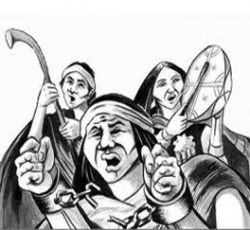NEWS RELEASE about SolidarityPolice/PrisonsIndigenous posted on December 15, 2010 by Guadillen
Chilean government asked FBI to investigate Mapuche
The FBI took charge of the investigation between 2008 and 2010
Chilean government asked FBI to investigate Mapuche
December 14th, 2010
Source: http://mapuche.nl
Diplomatic cables recently released by WikiLeaks indicate that the Chilean government solicited U.S. intelligence to investigate their indigenous activists. Former interior minister Edmundo Pérez-Yoma feared that the Mapuche (native people of Chile) had links with international terrorist organizations like the FARC in Colombia or the Spanish ETA.
http://www.examiner.com/foreign-policy-in-glendale-ca/chilean-government...
The FBI took charge of the investigation between 2008 and 2010, when some arson attacks were perpetrated in the Araucanía (south of the country), where indigenous communities claim ancestral rights over some lands.
Despite suspicions from former president Michelle Bachelet’s cabinet members, the investigation concluded that the Mapuche were mostly peaceful people. According to the diplomatic cables, the Mapuche conflict has been magnified by the conservative media, and did not represent a real danger in terms of security for the Chilean State.
“The destruction of property, which represents the vast majority of the illegal actions of the Mapuche, is often presented in full color with cheeky headlines and sometimes with a much higher coverage than more serious crimes committed by non-indigenous Chileans” U.S. intelligence documents asserted, almost in an ironic tone.
Eighty days of hunger strike
Current president of Chile Sebastian Piñera declared that the Araucanía was “in flames” while he ran for office last year. In July, more than thirty Mapuche convicts held a long hunger strike, protesting for being judged by military justice, which has jurisdiction only over war cases.
Some Mapuche activists risked life in prison for setting fire to a farm or truck.
Through the mediation of the Catholic Church, the Chilean government sent two bills to Congress to reform the military justice system, reaching an agreement with the Mapuche communities to lift the hunger strike eighty days after it began. Human Rights organizations have critiqued the way the Chilean government reacted to the Mapuche
conflict: “The modification of the military justice system is only partial, because the bill submitted by the government would still leave open the possibility that civilians could be subject to military jurisdiction. That is inadmissible, from the international point of view," said Jorge Contesse, director of the Human Rights Centre at the private Diego Portales University (UDP) in a recent interview.
The site for the Vancouver local of The Media Co-op has been archived and will no longer be updated. Please visit the main Media Co-op website to learn more about the organization.

Comments